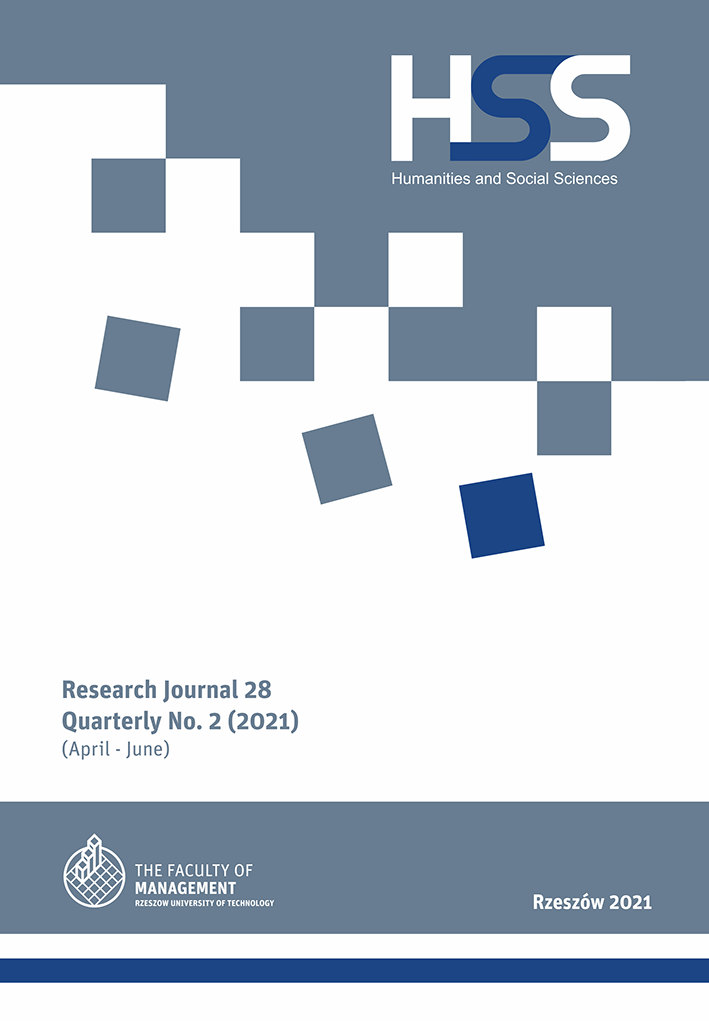Abstract
This article reports the results of research performed during the “DUAL. Transnational cooperation towards supporting dual education in vocational education and training institutions” (DUAL) project implemented by a consortium of labour market institutions located in Poland and Belgium. The aim of the research was to determine the status the attractiveness and quality of the current vocational education offered at the regional level, preparation of students for the transition from the education system to the local labour market, implementation of dual education by schools, and the required module in vocational counselling in schools in the Subcarpathian voivodeship, including in the context of counteracting NEET (i.e., not in employment, education or training) phenomenon. The research, carried out as part of the DUAL project, permitted identification of trouble spots within Subcarpathia in the context of vocational education, and the conclusions from the research will be used to support educational institutions as well as to construct recommendations for labour market institutions.
References
Aili, C., Nilsson, L-E. (2015). Dual learning – a challenge for higher education in the new landscape of governance. “Tertiary Education and Management” No. 4 (21). DOI: 10.1080/13583883.2015.1068367.
Boguszewski, R., Makowska, M. (2013). Analiza danych zastanych – zagadnienia wstępne [Analysis of existing data – preliminary issues] [in:] Makowska, M., ed. Analiza danych zastanych. Przewodnik dla studentów [Analysis of existing data. Guide for students]. Warsaw: Scholar Publishing House.
Broszkiewicz, W. (2018a). Raport z badań FGI z osobami pracującymi przeprowadzonych w ramach projektu „DUAL. Ponadnarodowa współpraca w kierunku wspierania kształcenia dualnego w placówkach szkolenia i kształcenia zawodowego” [FGI research report of employed individuals carried out within the "DUAL. Transnational cooperation towards supporting dual education in vocational education and training institutions" project], Rzeszów.
Broszkiewicz, W. (2018b). Raport z badań FGI z młodzieżą (uczniami, absolwentami oraz tzw. NEET) przeprowadzonych w ramach projektu „DUAL. Ponadnarodowa współpraca w kierunku wspierania kształcenia dualnego w placówkach szkolenia i kształcenia zawodowego” [FGI research report of young people (students, graduates and the so-called NEETs) carried out within the „DUAL. Transnational cooperation towards supporting dual education in vocational education and training institutions” project]. Rzeszów.
Bura, M., Barańska, W., Cieślik, W. (2014). Dual education system na przykładzie Politechniki Poznańskie [Dual education system in the case of Poznań University of Technology]. “Logistyka”, No. 6.
Chmiel, Ł. (2018). Raport desk research nt. kształcenia dualnego w placówkach szkolenia i kształcenia zawodowego opracowany w ramach projektu „DUAL. Ponadnarodowa współpraca w kierunku wspierania kształcenia dualnego w placówkach szkolenia i kształcenia zawodowego” [Desk research report on dual education in VET institutions prepared within the „DUAL. Transnational cooperation towards supporting dual education in training facilities and vocational education” project]. [Access: 30.06.2021]. Access on the internet: https://www.projektdual.pl/assets/media/raport-desk-research-natemat-ksztalcenia-dualnego.pdf
German dual education system. [Access: 03.05.2021]. Access on the internet: https://www.goethe.de/ins/pl/pl/spr/eng/eib/dub.html?forceDesktop=1
Górecka, H. (2007). Szkolnictwo w Polsce w XIX i XX wieku [Education in Poland in the 19th and 20th centuries] [in:] Pilh T., ed. Encyklopedia Pedagogiczna XXI wieku [Pedagogical Encyclopedia of the 21st century], Vol. VI. Warsaw: Wydawnictwo Żak.
Kwiatkowski, S. M. (2013). Kształcenie zawodowe w formach szkolnych – wyzwania edukacyjne i gospodarcze [Vocational education in school forms – educational and economic challenges]. “Educational Debate” No. 6.
Le Menestrel, S. (2020). Dual Language Learning and Educational Success for Youth. “Journal of Youth Development” No. 3 (15). DOI: 10.5195/jyd.2020.947.
Lis, M., Miazga, A. (2014). Czas na jakość w szkolnictwie zawodowym. [Time for quality in vocational education.], “IBS Policy Paper” No. 03/2014.
Liszka, D., Walawender, P. (2018). NEET Youth – the concept’s presence in the European Union’s Youth employment policy and why it is so problematic. “Humanities and Social Sciences” no. 4 (23). DOI: 10.7862/rz.2018.hss.77.
—— (2019). Cross-sectoral cooperation towards a work-life balance. “Humanities and Social Sciences” No. 1 (26). DOI: 10.7862/rz.2019.hss.6.
—— (2021). The NEET youth program in the Subcarpathian voivodeship in the light of new research. “Humanities and Social Sciences” No. 1 (28). DOI: 10.7862/rz.2021.hss.05.
Maison, D. (2001). Zogniskowane wywiady grupowe. Jakościowa metoda badań marketingowych. [Focus group interviews. Qualitative method of marketing research]. Warsaw: PWN Publishing House.
Nogueira, A. M. (2014). Briefing PE 529.082. [Access: 03.05.2021]. Access on the internet: https://www.europarl.europa.eu/RegData/etudes/BRIE/2014/529082/IPOL_BRI(2014) 529082_PL.pdf
Sondergaard, L., Murthi, M., Abu-Ghaida, D., Bodewig, Ch., Rutkowski, J. (2012). Skills, not just Diplomas. Managing Education for Results in Eastern Europe and Central Asia. Washington: The World Bank.
Supreme Audit Office (2015). Informacja o wynikach kontroli: system szkolnictwa zawodowego. [Information on audit results: vocational education system]. Warsaw: NIK.
Szafraniec, K., ed. (2011). Młodzi 2011 [Youth 2011]. Warsaw: KPRM.
Szymańska, A., ed. (2017). Analiza sytuacji szkolnictwa zawodowego w województwie łódzkim [Analysis of the situation of vocational education in Łódź Voivodeship]. Łódź: Regional Territorial Observatory of Łódź Voivodeship.
Šćepanović, V., Martín Artiles, A. (2020). Dual training in Europe: a policy fad or a policy turn? “Transfer: European Review of Labour and Research” No. 1 (26). DOI:10.1177/ 1024258919898317
Tworzydło, D., Lach, M., Lis, A., Szuba, P., Wasilewski, P., Zajic, M. (2018). Diagnoza sytuacji na rynku edukacyjnym w województwie podkarpackim [Diagnosis of the situation on the educational market in Subcarpathian Voivodeship]. Rzeszów: Exacto.


